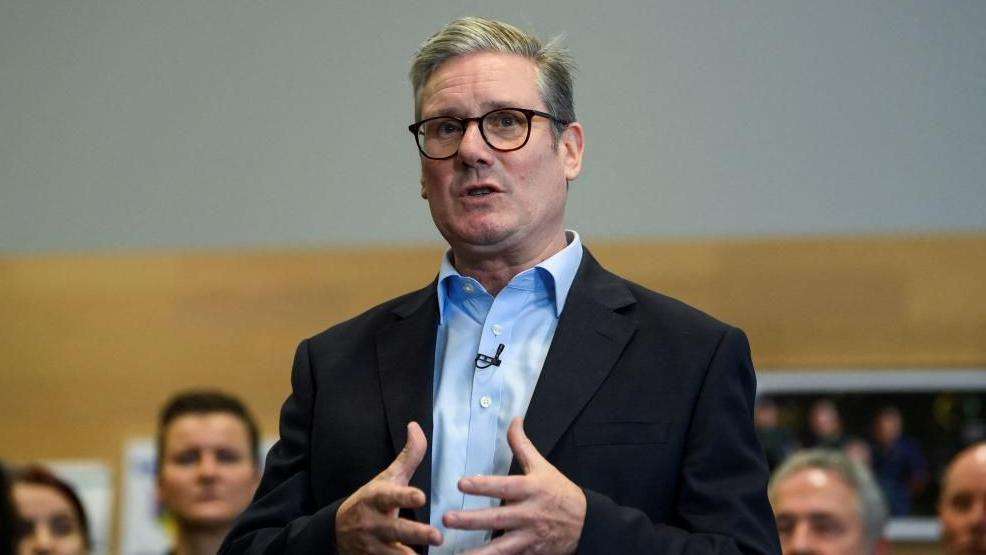Prime Minister Keir Starmer is under mounting pressure from British farmers, who warn that a comprehensive trade deal with the United States under former President Donald Trump could devastate the UK’s agricultural sector.
Farmers fear the potential flooding of British markets with American products like chlorinated chicken and hormone-fed beef, which they argue would “destroy our family farms and healthy food standards.”
Thousands of farmers, already protesting Labour’s controversial “tractor tax,” are gearing up for further demonstrations.
The inheritance tax measure, introduced by Chancellor Rachel Reeves in October, imposes a 20% levy on farms valued at £1 million or more. Farmers argue that this policy will cause “irreparable damage to farming businesses.”
Liz Webster, founder of the Save British Farming campaign group, is among those urging Starmer to rule out any trade deal with the US that includes food and farming provisions. “If Starmer allows US low-standard foods to dominate our supermarket shelves, there will be no chance of the EU agreeing to a veterinary agreement,” Webster said, emphasizing the critical need for a food trade deal with the European Union.
Farmers’ anger over Labour’s policies reached a boiling point after the Budget announcement, with Starmer earning the unflattering moniker “Keir Starmer the farmer harmer.”
Despite the backlash, Starmer has taken steps to engage with agricultural leaders, inviting National Farmers’ Union (NFU) president Tom Bradshaw to Downing Street for discussions.
Bradshaw noted a “more conciliatory tone” during the meeting but stopped short of claiming any promises were made. “The Prime Minister is very much in listening mode, and I hope that he’s able to act on what he’s heard this afternoon,” Bradshaw said.
However, he also expressed frustration, adding, “We will continue to fight this. I want to work with the government, but they are making it incredibly difficult.“
While the NFU has indicated it could support a trade deal with the US under certain conditions, such as a “level playing field” on animal welfare standards, the union maintains that prioritizing a comprehensive agreement with the EU is essential.
Concerns Over Food Standards And Brexit Policies
Farmers and industry experts remain deeply concerned about the impact of US agricultural imports on Britain’s food standards. Practices such as chlorinating chicken and using hormones in beef production — common in American factory farming — have long been contentious issues in UK trade discussions.
Webster highlighted the broader implications of pursuing a US trade deal, accusing Starmer of continuing Brexit policies that harm economic growth.
“Brexit was sold to the public with endless lies, but in truth, Brexit was always about leaving the EU to join the US with a trade deal. But a USA deal means allowing chlorinated chicken and hormone-fed beef to destroy our family farms and healthy food standards.”
Liz Webster

Webster also criticized Starmer’s approach to governance, arguing that he has alienated voters with policies such as cutting winter fuel payments and imposing tax hikes. “Had Keir Starmer begun by dropping his ludicrous red lines on Brexit, growth would’ve returned, business would be happy, and his popularity would’ve soared,” she said.
Government sources have sought to reassure the farming community, stating that Starmer would not “sell out” British farmers with a US trade deal. Instead, they suggest that his administration will prioritize negotiating food trade agreements with Brussels.
This approach follows the example of four previous Conservative prime ministers, who also refused to accept US trade deals that undermined UK food standards.
Chancellor Rachel Reeves has also attempted to ease tensions, stressing that Labour remains committed to protecting British agriculture. “We’re not going to allow British farmers to be undercut by different rules and regulations,” she said, defending her controversial tax policies.
READ ALSO: Bawumia Appeals for Votes Ahead of Special Voting























